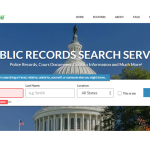There are plenty of reasons why you may want to get a federal background check on yourself. Maybe you’re just interested in seeing what’s in your record. Perhaps you’d like to know what your potential employers will see when they perform a background check on you.
Whatever your reason is, you’ll be glad to know that you can easily get a federal background check on yourself. All you need to do is put in a request for an Identity History Summary with the FBI. After paying the required fees and submitting the required document, you’ll get a response detailing your criminal record history, or lack thereof.
So, if you want to find out what the FBI knows about you, keep reading. We’ll explain everything you need to do from start to finish and tell you any important details about the subject.
How to Order a Federal Background Check on Yourself
Thankfully, getting a federal background check on yourself isn’t that complicated. All you have to do is request one from the FBI, and they’ll get you your report in a few days (though sometimes it can take a month or so). So, how do you order a federal background check? Check out the steps listed below.
1. Submit a Request and Fill in Your Applicant Form
The first thing you need to do is put in a request for a federal background check, which is known as an Identity History Summary check. You can do this both online or by mail. However, sending the request online is much easier, and you’ll also get your results faster.
Still, if you’re more comfortable using the mail service, go right ahead. Just keep in mind that mail requests generally take much longer for the result to come out.
Whichever way you decide to do it, you’ll be required to fill in the application form for an Identity History Summary, which is the exact same thing as a criminal history record or a “rap sheet.”
In it, you’ll be asked to put in your name, place of birth, address, phone number, email address, and the last four digits of your social security number. Just make sure you fill in all the required fields so that your request doesn’t fall through, and if you’re mailing your form, do not use a self-addressed envelope.
2. Record Your Fingerprints
Once you’re done with the form, the next step in the process would be to record your fingerprints.
If you’re putting in an online request, then you should go to the closest participating U.S. post office location in order to submit your fingerprints electronically. You also have the option of mailing in your fingerprint card along with a copy of your confirmation email to the FBI CJIS division. Just beware that both methods may require additional fees.
Also, take care to submit a current fingerprint card. If you provide a previously processed card or a copy, it won’t be accepted, and you’ll be asked to resubmit your fingerprints, costing you more money and decaying the report.
For more tips on properly recording your fingerprints, check out the FBI’s instructions on the matter, and if it’s possible, try to have your fingerprints taken by a fingerprinting technician to ensure the best legible prints.
3. Pay
The last thing you need to do is to pay for your Identity History Summary Check. You can choose to pay with a certified check, money order, or credit card. Don’t use cash, personal, and business checks, as they’re not an acceptable form of payment.
Usually, the cost is $18 for a single background check. If you can’t pay that amount, you can request a waiver and include a claim and proof of indigence. Also, know that spending more money won’t get you the report faster, so don’t let anyone fool you into paying more.
Once the FBI gets your application, fingerprint card, and payment, they’ll start processing your request and then send you a sealed response letter when they’re done. You’ll pay an additional $18 for each letter if you need multiple sealed responses.
However, if you don’t need it to be sealed, you can make as many copies as you want of your original response. This also applies to electronic responses, where you can print any number of copies you need.
What Will You Receive When You Order a Federal Background Check?
There are two scenarios here. The first would be that the FBI doesn’t have you on file. In that case, you’ll receive a response from the U.S postal service stating that you have no prior arrests or prosecutions documented among the FBI data.
However, if you do have a criminal background history, you’ll receive all the information found about you in the FBI’s National Crime Information Center System (NCIS) and Integrated Automated Fingerprint Identification System (IAFIS).
Essentially, the NCIC database contains records of missing persons, wanted fugitives, as well as all state and local agency arrests. Now, as you know, whenever a person is arrested, they get fingerprinted as part of the process. As such, all arrest records are linked by fingerprints, and that’s how the FBI can find out if you’ve previously been arrested.
So, when you submit a request for an Identity History Summary Check, the FBI response will inform you of all your arrests as well as the date and charge detail of each arrest. The response may also contain any felonies and serious misdemeanors you’ve committed.
However, finding fines and moving violations in an FBI check is infrequent. That’s because these offenses are usually not reported to the FBI due to their insignificance. Nevertheless, some agencies do report those events to the FBI, so you can never be too sure.
How Long Does It Take to Receive Your Response?
Currently, the processing time for a mailed Identity History Summary request can take anywhere from 2 weeks to a month. That’s because you have to include the time it takes for your request to reach the FBI, as well as the time needed to process your request.
Thankfully, though, the waiting time is much shorter for electronically-submitted requests. Once the FBI gets your fingerprints, you can get your result in about 3-5 days.
Still, you should know that federal background checks for adoption can take a long time, regardless of whether it’s been ordered by mail or electronically. That’s because these background checks need to be more in-depth than those required for a job. On average, Child Protectives Services can take 30+ business days to complete their federal background checks.
Is There a Way You Can Speed Up the Process?
Sometimes, working with an FBI-approved channeler can speed up the delivery of your federal background check. FBI-approved channelers are private businesses authorized to record your fingerprints and submit your application form on your behalf.
Since you submit your data, fingerprints, and payment all in the same place, you can hasten the response delivery by quite a lot. Still, make sure to contact the FBI-approved channelers before using their services to ask about their availability, fees, and processing time.
What Do You Do if Your Rap Sheet Contains False Information?
If your rap sheet contains incomplete or incorrect information, you can put in a request to change or correct that information. This is what’s known as challenging your Identity History Summary.
In short, you’ll submit a challenge request, stating precisely which piece of information you think is incorrect. You’ll also be required to submit the FBI Universal Control Number (FBI Number) found in your rap sheet.
You can also provide the State Identification Number (SID) written in your state criminal history record, together with the abbreviation of the state in which you committed your offense.
For more information on challenging your Identity History Summary, check out the FBI website.
Who Needs a Federal Background Check?
The most common people to order an FBI background check are employers looking to hire people in highly-sensitive jobs. And it’s not only hiring. Some professions require that you have a clear criminal record in order to maintain your job.
This usually applies to people who deal with children or the elderly. It also includes jobs that require licenses, like health care professionals and law enforcement agencies.
Additionally, any government job, even county-level jobs, will probably require you to undergo an FBI background check. Occasionally, some families will want an FBI background check for a potential nanny or driver to guarantee their children’s safety.
Outside of employment, FBI checks are also needed by adoption agencies. This is to verify whether certain individuals are fit to become parents based on their previous charges or convictions.
Do Expunged Records Show Up on FBI Background Checks?
As you know, expunged records are records that are destroyed or sealed from view by the public. As such, it would make sense that these records don’t appear on your federal background check. However, this isn’t always the case.
Occasionally, expunged records can appear on an FBI background check if the court has failed to make the information about the expungement public. It can also happen if there has been confusion about whether an individual’s records need sealing.
Should You Get a Federal Background Check on Yourself?
Getting an FBI background check on yourself can actually be helpful in a lot of situations. For one, you can use it to make sure that the information your potential employers are viewing is correct.
Moreover, there are certain instances when specific information should be removed from your criminal history record after a certain amount of time has passed.
By getting an FBI background check, you can ensure that this removal has, in fact, happened, and if it hasn’t, you can ask for it to be done straight away. That being so, you can avoid any unwarrantable rejections from an employer or an adoption agency.
Still, keep in mind that you won’t be able to use your Identity History Summary for employment, licensing, or adoption purposes.
According to federal law or state statute, all the previous purposes require you to submit your request through specific organizations. These organizations may be the federal requesting agency, your state identification bureau, or another authorized channeling agency.
So, if you’re unsure where to submit your request, make sure to contact the requesting agency or the proper state identification bureau for more information.
Can You Do a Federal Background Check on Someone Else?
Yes, but that’s only if you have their permission to do so.
So, if you’re an employer or a parent wishing to perform a federal background check on a potential hire, you need to get their signature on the application form as well as all their fingerprint cards. If you don’t include any of these items, your request won’t be valid, and it will not be processed.
Can Employers Find out Your Information From Something Other Than Federal Background Checks?
While federal background checks can tell employers a lot of information about you, they can be a bit time-consuming, and not all applicants will agree to them. So, unless an employer is required by law to perform a federal background check on you, they can dig up your details using other methods.
For instance, they can perform county/state-level searches for your criminal and public records. Nationwide criminal databases are also available for search.
Employers can also look at your driving records to determine whether you’ve had any major traffic violations. DUIs, for example, are sometimes listed within your driving record, not your criminal record.
All in all, these records can show the same thing found in your federal background check. So, it’s ultimately up to your employer which method to use.
FAQs
Can Someone Else Pay for Your Identity History Summary?
Yes. They just need to provide the payment information when submitting your request.
Where Should You Get Your Fingerprints Taken?
If you choose to send your request electronically, go to the nearest U.S. Post Office location to submit your fingerprints electronically.
If you’re planning on mailing your request, then go to any local law enforcement agency.
How Long Does it Take to Process a Challenge for an Identity History Summary?
On average, the FBI responds to challenges within 45 days of receiving the request.
How Much Does Challenging an Identity History Summary Cost?
Nothing. No fees are needed to challenge your Identity History Summary.
Can You Challenge Information Without Getting an Identity History Summary?
No. Since all arrest data kept by the FBI is supported by fingerprints, they must be 100% positive of your identity, which can only be done when you submit your name and fingerprints via the Identity History Summary request.
Conclusion
Knowing what your federal background check contains can help you prepare for most situations with your potential employers. So, if you want to get a background check on yourself, you just need to submit a request for an Identity History Summary on the FBI’s website.
Once the FBI receives your request in combination with your fingerprints and a payment of $18, you should be getting your results in a week or so.
Related Posts
 Can a Juvenile Record Be Used Against You?
Can a Juvenile Record Be Used Against You? How Long Does a Misdemeanour Stay on Your Record?
How Long Does a Misdemeanour Stay on Your Record?![Best Employee Background Check [Our Reviews and Comparisons]](https://backgroundhawk.com/wp-content/uploads/2021/02/6-min-150x150.jpg) Best Employee Background Check [Our Reviews and Comparisons]
Best Employee Background Check [Our Reviews and Comparisons] How Long Does A Restraining Order Stay On Your Record?
How Long Does A Restraining Order Stay On Your Record? How Often Do Police Check Hotels for Warrants?
How Often Do Police Check Hotels for Warrants? How Much Jail Time for a DUI Warrant
How Much Jail Time for a DUI Warrant Instant Checkmate Reviews – User Ratings, Pricing, FAQ
Instant Checkmate Reviews – User Ratings, Pricing, FAQ How Long Does It Take to Get Fingerprinted?
How Long Does It Take to Get Fingerprinted? How to Find Out if Someone Is in Police Custody
How to Find Out if Someone Is in Police Custody Can You Get on a Plane With a Warrant?
Can You Get on a Plane With a Warrant?

